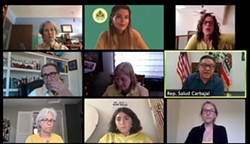Throughout most of her adult life, San Luis Obispo resident Dona Hare Price has been active in advocacy and social justice work. So when COVID-19 hit and so many Californians, including Price, found themselves under a stay-at-home order in March, Price decided to tackle California's housing problem, an issue made all the more visible now that millions of Americans are without work because of coronavirus-related closures.
She assembled a team of grassroots organizers, developed partnerships with 16 local organizations that represent roughly 10,000 Central Coast residents, and within weeks of the state shelter-at-home order, SLO County's Rent and Mortgage Relief for All Coalition was born. The mission, Price said, is in the name.

- PHOTO COURTESY OF RENT RELIEF COALITION
- SHELTER FOR ALL On May 12, several key members of the Rent and Mortgage Relief for All Coalition met with Congressman Salud Carbajal (D-Santa Barbara) in a Zoom meeting to discuss HR 6515.
"When we say shelter in place," she told New Times, "everyone deserves a place to shelter."
Although California Gov. Gavin Newsom issued a ban on the enforcement of eviction orders on March 27, it only lasts until May 31. Whether that order will be extended is yet to be determined, and Price said evictions are still happening in SLO County and all across the U.S.
"Relief has to happen on a local, state, and federal level," she said.
That's where the Rent Relief Coalition comes in. The group is busy lobbying for relief programs at all levels of government, talking with politicians and public officials inside SLO County and out.
On May 12, several key members of the coalition met with U.S. Rep. Salud Carbajal (D-Santa Barbara) in a Zoom meeting to discuss HR 6515. Despite some loopholes, Price called it the "gold standard" in terms of housing relief packages. The bill would primarily suspend rental and mortgage payments for the duration of the federal emergency declaration related to COVID-19 and 30 days after.
Locally, the Rent Relief Coalition successfully pushed several cities to write state lawmakers in support of further funding for rent and mortgage assistance. Now, Price said, the group is pressuring county and city leaders to use Community Development Block Grant (CDBG) funds for direct rent and mortgage relief assistance.
The CDBG program provides annual grants to states, counties, and cities to develop better opportunities for low-income people. Price said the funds are often used for rapid rehousing for residents who are already experiencing homelessness. While the Rent Relief Coalition doesn't want to stifle any of the work being done by agencies dedicated to homelessness, Price said dollars going toward rent and mortgage relief would help prevent homelessness in the first place.
An analysis recently conducted by a Columbia University professor that COVID-19 could result in as much as a 45 percent increase in homelessness nationwide over the next six months, and Price said CDBG funds attached to the CARES Act and new allocations related to COVID-19 could stop that from happening.
"This is something that can be done," she said. "It can be used. There's flexibility."
Although some cities are exploring the use of CDBG funding for rent assistance—the city of SLO is considering how to use its federal CDBG COVID-19 funding allocation at a Homeless Services Oversight Committee on May 29—no direct assistance programs have been developed.
But a similar program is already operating in Grover Beach, according to City Manager Matt Bronson. While cities in SLO County are part of the county's CDBG entitlement program, in which the county receives CDBG funds and then allocates it to individual cities annually, Grover Beach does things differently.
Because of its population and high rate of low- and moderate-income residents, Grover Beach is the only city in the county eligible for the non-entitlement CDBG program, which allows Grover to apply for its own CDBG funds. It's a competitive process, but Bronson said the grant awards are much larger.
"In our case," Bronson said, "we've been very successful."
Since Grover split from the county in 2013, it's secured more than $3 million in CDBG funding for water line improvements and $645,000 for programs geared toward eviction prevention and security deposit assistance.
This year, Grover applied for another $465,000 in CDBG funding that, if awarded, will again go toward the eviction prevention and security deposit programs. Although the city started working on its application in January before COVID-19 had an impact locally, Bronson said City Council formally approved the application in April, recognizing that the needs behind the programs would be even more pronounced given the economic impacts of COVID-19.
Grover is also eligible for another $108,000 in CDBG funds through the CARES Act this year, and Bronson said that will be up for discussion on June 22.
Comments